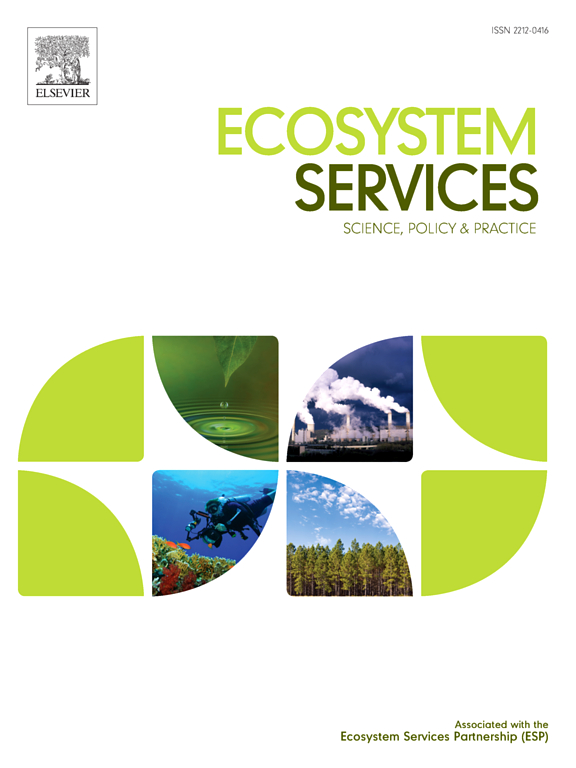Ecosystem services governance: A cross-realm lever for sustainability transformation
IF 6.6
2区 环境科学与生态学
Q1 ECOLOGY
引用次数: 0
Abstract
The leverage points perspective is used increasingly in sustainability transformation research. Scholars have proposed three realms of leverage for the sustainability research agenda: human-environment interactions; institutional dynamics, and sustainability-related knowledge creation and use. However, studies aiming to better understand the role of cross-realm levers, which create parallel change in human-nature interactions, institutions, and knowledge production and use, remain scarce. To address this research gap, we provide an Ecosystem Services Governance (hereafter, ESGov1) lens to conceptually and empirically investigate the potential cross-realm lever role of ESGov for sustainability transformations. Through theoretical and empirical analyses we: 1) identify the key features within the three sustainability transformation realms and analyze how ESGov can shape and influence them; 2) test the potential for ESGov to be a cross-realm lever for sustainability transformation using a case study from Agua Blanca (Ecuador); 3) navigate intra-realm dynamics, identifying features from diverse realms that may simultaneously be fostered by ESGov; and, 4) ultimately, contribute to the transformation, ecosystem services, and governance literatures by highlighting the enabling mechanisms within ESGov that can facilitate cross-realm sustainability transformation interventions. This study reveals that ESGov, when configured to embrace relational thinking, collaborative governance, and inclusive knowledge integration, can effectively serve as a cross-realm lever. Ultimately, we advocate for a shift from Ecosystem Services to ESGov framework as a means to catalyze cross-realm interventions, advancing sustainability through a nuanced understanding and designing of the dynamic interplay between society and the environment.
生态系统服务治理:可持续性转型的跨领域杠杆
杠杆点视角在可持续转型研究中得到越来越多的应用。学者们提出了可持续性研究议程的三个杠杆领域:人与环境的相互作用;制度动态和与可持续性相关的知识创造和利用。然而,旨在更好地理解跨领域杠杆作用的研究仍然很少,这些杠杆在人与自然的相互作用、制度和知识的生产和使用中产生了平行的变化。为了解决这一研究差距,我们提供了一个生态系统服务治理(以下简称ESGov1)的视角,从概念上和实证上调查ESGov在可持续发展转型中的潜在跨领域杠杆作用。通过理论和实证分析,我们:1)确定三个可持续转型领域的关键特征,并分析ESGov如何塑造和影响它们;2)通过对厄瓜多尔阿瓜布兰卡的案例研究,测试ESGov作为可持续发展转型跨领域杠杆的潜力;3)驾驭领域内部动态,识别ESGov可能同时培育的不同领域的特征;4)最终,通过强调ESGov内部能够促进跨领域可持续性转型干预的支持机制,为转型、生态系统服务和治理文献做出贡献。本研究表明,当ESGov被配置为包含关系思维、协作治理和包容性知识整合时,可以有效地作为跨领域杠杆。最后,我们主张将生态系统服务框架转变为ESGov框架,以此作为催化跨领域干预的手段,通过对社会与环境之间动态相互作用的细致理解和设计来促进可持续性。
本文章由计算机程序翻译,如有差异,请以英文原文为准。
求助全文
约1分钟内获得全文
求助全文
来源期刊

Ecosystem Services
ECOLOGYENVIRONMENTAL SCIENCES&-ENVIRONMENTAL SCIENCES
CiteScore
14.90
自引率
7.90%
发文量
109
期刊介绍:
Ecosystem Services is an international, interdisciplinary journal that is associated with the Ecosystem Services Partnership (ESP). The journal is dedicated to exploring the science, policy, and practice related to ecosystem services, which are the various ways in which ecosystems contribute to human well-being, both directly and indirectly.
Ecosystem Services contributes to the broader goal of ensuring that the benefits of ecosystems are recognized, valued, and sustainably managed for the well-being of current and future generations. The journal serves as a platform for scholars, practitioners, policymakers, and other stakeholders to share their findings and insights, fostering collaboration and innovation in the field of ecosystem services.
 求助内容:
求助内容: 应助结果提醒方式:
应助结果提醒方式:


